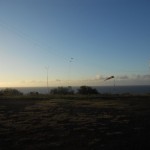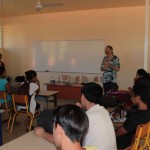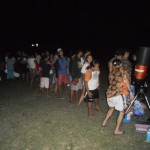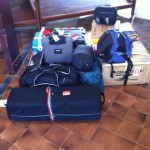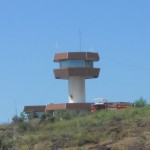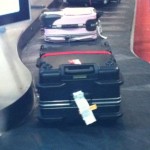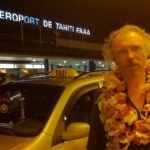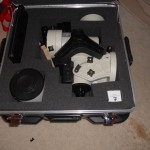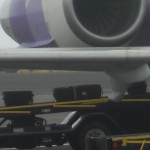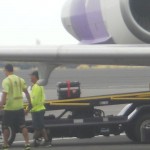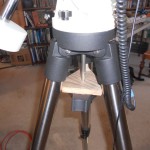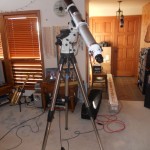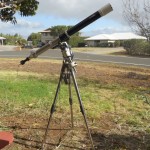A day of wonderful experiences for all!
Eric and Philippe stayed at Taiohae to allow students and people from the village to watch the transit. Cédric built with his students a cardboard-based camera obscura (actually a few of them!) which proved to be very effective! Philippe found a problem which arose on his refractor at the end of the star gazing yesterday. It was back in good shape in time for the transit.
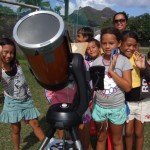 All the college classes as well as the three elementary school classes came and took turn to see Venus in front of the Sun first with the eyes thanks to eclipse glasses brought from Hawaii and offered by the Mauna Kea Visitor Station. The next stop in the Taiohae Venus Transit Tour station was Philippe’s reflector, with the whole Sun and many spots in addition to Venus itelf. The tour culminated with a close-up at Venus through Eric’s C11.
All the college classes as well as the three elementary school classes came and took turn to see Venus in front of the Sun first with the eyes thanks to eclipse glasses brought from Hawaii and offered by the Mauna Kea Visitor Station. The next stop in the Taiohae Venus Transit Tour station was Philippe’s reflector, with the whole Sun and many spots in addition to Venus itelf. The tour culminated with a close-up at Venus through Eric’s C11.
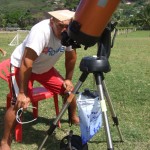 It stopped only when the Sun set, early, behind the mountains towering the village everywhere (but toward South…). The weather behaved, with only a couple of interruptions due to clouds passing by!
It stopped only when the Sun set, early, behind the mountains towering the village everywhere (but toward South…). The weather behaved, with only a couple of interruptions due to clouds passing by!
Christian left the village at 6:30am for Terre Déserte and the airport. A long winding road, half of it in the fog this morning. Its highest point is a bit above 1000m , cows or horses are free to wander around, and there quite a few places where there is just one lane… Fortunately, not that many cars: a blessing for this one hour long trip!
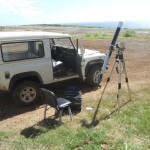 Set-up at the airport took some time, as the wind was blowing and not as stable as was hoped on Sunday when we arrived. The staff at the control tower was wonderful and I could get the equipment ready with some time to spare to check the setup. The weather was clear, but for a very small cloud which came in just at the time of the beginning of the transit.
Set-up at the airport took some time, as the wind was blowing and not as stable as was hoped on Sunday when we arrived. The staff at the control tower was wonderful and I could get the equipment ready with some time to spare to check the setup. The weather was clear, but for a very small cloud which came in just at the time of the beginning of the transit.
The wind was clearly an issue, even though it was not that strong. The length of the tube joined to the need to make the base of the tripod narrow to accommodate the 8 deg latitude of the place did not help the mount to be as stable as it should. It was going to be difficult, if not just impossible, but could still work!
Nothing at the beginning of the transit… nothing a couple of minutes later… No just no aureole… but no transit. Something was wrong! Indeed, moving along the edge of the Sun (the field of view is very small) finally brought the transit area in the field. A severe misalignment! Too late to re-orient the whole coronograph… Still nice to watch, in-spite of the horrible shaking. Nothing aureole-wise as the coronograh was not used and the images are just too bad. More information on what happened once I know for sure about it… and once I am back in Hawaii. Our Expedition started barely three days ago and there is much to accomplish in the coming 12 days!
In addition to the staff of the airport, a few people walked up to the tower and watched the transit in the afternoon, including the crew of a military jet from the French Marines doing patrols and rescue missions in the area. We had a nice discussion about astronomy as well as about their job!
Calling CQ on the air for half an hour, using one of the HF antennas of the airport tower, did not bring any answer. I had a good contact with a station in ZL, and could not break in a few QSOs going for ages between “old friends”… So, we are done with TX5VT from Nuku Hiva. Let’s hope for less busy times on the next islands 😉 Stay tuned…
The sun was rapidly diving in the ocean, so time to pack everything and hit the road to at least ride part of it in daylight. The ride back took longer, with fog again, and more cows and horses on the road… In Taiohae, the rest of the team was happily waiting and we had a good dinner and more talks. Signing off now… (past midnight already!)

